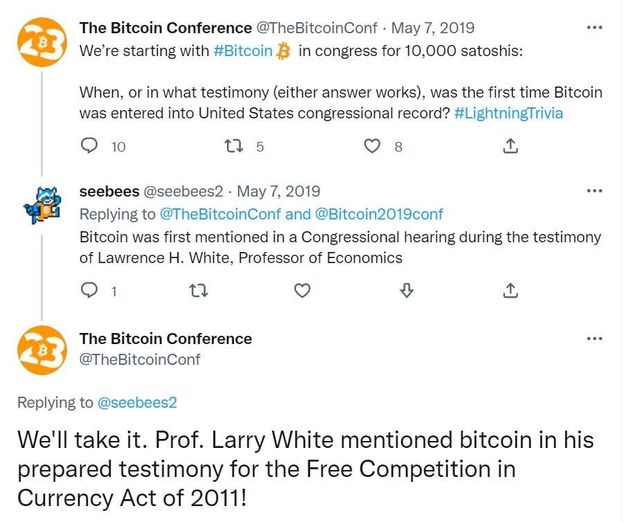The evolution of money
| Lecture handout: The evolution of money* |
Textbook Reading: Chapter 7 (Section 7.3; pp. 216-225)
“I’m very interested to watch the crypto community relearn centuries of monetary economics” John Cochrane (Conversations with Tyler, March 10th 2021)
Can someone really understand crypto currencies and the future of digital money without having a solid grasp of why money even exists? This topic is a great example of why historic knowledge and theoretical clarity are crucial when involved in fast changing industries – it provides a benchmark to verify the bold claims made by industry practitioners. The purpose of this lecture is to gain a deep understanding of what money is and how it has evolved.
Background readings:
- Menger, C., 1892, “On the Origins of Money” Economic Journal, 2:239-55
- Radford, R.A., 1945, “The Economic Organization of a P.O.W. Camp”, Economica, 12(48):189-201
Interactive practice
Here I am at a museum:
Extra activity: The Bank of England Museum
Fun fact
Apparently the first person to mention Bitcoin in a congressional hearing was Larry White, in 2011!
For more on the links between free banking academics and the early history of crypto see:
- How 1990s Libertarians Laid the Groundwork for Cryptocurrency, by Aaron von Wirdum, Reason, April 2024
The Starbucks hustle:
Starbucks isn’t a bank, but here’s a good Twitter thread on their fintech capabilities:
There's a saying in Fintech:
You either die a consumer goods company, or live long enough to see yourself enter financial services.
One company has managed to do both.
Let me tell you why Starbucks is one of the most successful banks in the U.S.: pic.twitter.com/yJUAxvBlvl
— Alex Johnson (@AlexH_Johnson) September 2, 2022
For more see JP King’s post, “Starbucks, monetary superpower“. And here’s my short video on The Starbucks Hustle:
Stablecoins
In May 2022 the stablecoin TerraUSD broke its peg to the dollar. A very good explanation of what happened, and why, is by Josh Hendrickson: When a Dollar Isn’t a Dollar. And so is this thread:
https://twitter.com/knifefight/status/1525146449914105856
Troubled currencies
- Steve Hanke runs the Troubled Currencies project which gathers black market data to construct up to date estimates of high inflation environments. You can see more here.
Recommended readings:
- Bitcoin: A Primer for Policymakers, Mercatus Center
- The Bullish Case for Bitcoin, Vijay Boyapati, March 2nd 2018 (for a printable pdf see here)
- Cowen, T., and Tabarrok, A., Cryptoeconomics (Chapter 8 in Modern Principles)
Further readings
- Piecing it together, The Economist, March 11th 2023 – a fascinating theory that the adoption of the silver coin contributed to democracy
Recommended audio:
- How fake money saved Brazil, Planet Money, October 5th 2010
- “Pierpaolo Barbieri on Latin American FinTech“, Conversations with Tyler, May 19th 2021 – in particular this shows the importance of knowing financial and economic history for tech founders
- “Brian Armstrong”, Conversations with Tyler, February 2021 – a great overview of how the CEO of Coinbase sees the crypto industry
- Hashpower – Part 1, Investors Field Guide – a fantastic early introduction to blockchain technology and potential of crypto assets
- Money and the rule of law – in conversation with Daniel Smith, Center for the Study of Governance and Markets, King’s College, November 3rd 2021 – an interview about Smith’s co-authored book where he provides a critique of central bank performance
Recommended video:
Here is a standard historical overview of money:
This is a great lecture video, by the late Steve Horwitz, summarising Carl Menger’s work on the origins of money:
If you are totally new to concepts like blockchain, bitcoin and NFTs and want a thorough account of the history and development, in a well produced an informative documentary that takes a highly skeptical and cynical approach, I recommend this:
For a more positive view of NFTs, an identification of the context in which they’ve emerged (post global financial crisis and great stagnation), and subjectivist approach to value, see this Twitter thread.
A good article debunking a lot of Web3 hyperbole is here:
- The Petty Pleasures of Watching Crypto Profiteers Flounder, by Charlie Warzel, The Atlantic, June 28th
Some argue that Bitcoin’s main value is as a focal point for crypto more broadly. In this sense it is like Kerrygold butter. See:
- Bailey, Andrew M. and Warmke, C., “Bitcoin is King”, Chapter 10 [PDF here]
Further activity
In September 2022 Sequoia Capital published a gushing profile of FTX founder Sam Bankman-Fried. In November they went bankrupt, and Sequoia removed the article. However, you can download a PDF version here.
Points to consider:
- Did SBF’s utilitarian philosophy contribute to his willingness to cross ethical boundaries? (His objective was to make as much “risk neutral” money as possible)
- If his intention was to contribute to the norms of capitalism, would he have behaved differently?
| Learning Objectives: Understand the origins of money and how this can be used to understand the role of central banks in a fiat money system, as well as to navigate the crypto landscape.
Cutting edge theory: Making assessments of digital and crypto currencies. |